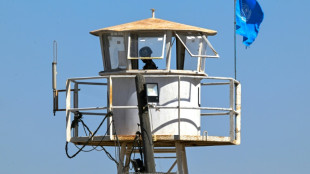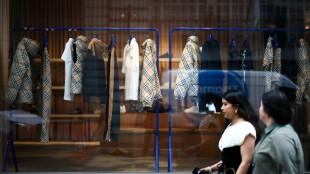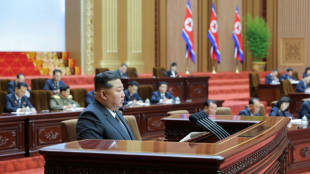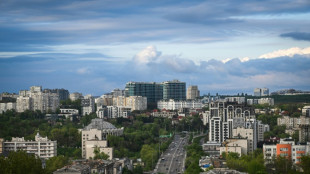
-
 Frenchman denies killing wife in case that captivated France
Frenchman denies killing wife in case that captivated France
-
Bavuma out of Test series in Pakistan as De Kock back for ODIs

-
 Bavuma out of Test series as De Kock back for white-ball games
Bavuma out of Test series as De Kock back for white-ball games
-
French town halls defy government warning to fly Palestinian flags

-
 French zoo returns poorly panda and partner to China
French zoo returns poorly panda and partner to China
-
IEA feels the heat as Washington pushes pro-oil agenda

-
 Three things we learned from the Azerbaijan Grand Prix
Three things we learned from the Azerbaijan Grand Prix
-
Spanish bank BBVA raises offer for rival Sabadell

-
 Tens of thousands join pro-Palestinian demos, strikes in Italy
Tens of thousands join pro-Palestinian demos, strikes in Italy
-
Man City's Silva fumes over lack of respect in schedule row

-
 Israeli army operations stir fears in Syria's Quneitra
Israeli army operations stir fears in Syria's Quneitra
-
Chelsea's Palmer likely to avoid groin surgery: Maresca

-
 Horner formally leaves Red Bull after agreeing exit from F1 team
Horner formally leaves Red Bull after agreeing exit from F1 team
-
Newcastle sign Wales full-back Williams

-
 Nigerian women protest for reserved seats in parliament
Nigerian women protest for reserved seats in parliament
-
Stocks mixed ahead of week's key US inflation data

-
 Experts question Albania's AI-generated minister
Experts question Albania's AI-generated minister
-
Philippine protest arrests leave parents seeking answers

-
 New boss of Germany's crisis-hit railways vows 'new start'
New boss of Germany's crisis-hit railways vows 'new start'
-
Just not cricket: how India-Pakistan tensions spill onto the pitch

-
 PSG star Dembele expected to beat Yamal to Ballon d'Or
PSG star Dembele expected to beat Yamal to Ballon d'Or
-
Burberry returns to London's top shares index

-
 French town halls fly Palestinian flag despite government warning
French town halls fly Palestinian flag despite government warning
-
China prepares to evacuate 400,000 as super typhoon makes landfall in Philippines

-
 Japan PM candidate vows 'Nordic' gender balance
Japan PM candidate vows 'Nordic' gender balance
-
Climate goals and fossil fuel plans don't add up, experts say

-
 Amazon faces US trial over alleged Prime subscription tricks
Amazon faces US trial over alleged Prime subscription tricks
-
Google faces court battle over breakup of ad tech business

-
 France, others to recognize Palestinian state as UN week gets underway
France, others to recognize Palestinian state as UN week gets underway
-
Burkina's LGBTQ community fears 'witch hunt' after anti-gay law

-
 Milan Fashion Week to mourn Armani, welcome new stars
Milan Fashion Week to mourn Armani, welcome new stars
-
LAFC's Bouanga makes MLS history with hat-trick in Salt Lake win

-
 Eagles top Rams in NFL thriller as Chiefs grab first win
Eagles top Rams in NFL thriller as Chiefs grab first win
-
Thousands evacuated in Philippines as super typhoon nears land

-
 Alaalatoa, Wallabies fired up to end All Blacks unbeaten Eden Park run
Alaalatoa, Wallabies fired up to end All Blacks unbeaten Eden Park run
-
Arrest tally grows after Philippine anti-corruption protest clashes

-
 Fritz downs Zverev to seal Team World Laver Cup win over Europe
Fritz downs Zverev to seal Team World Laver Cup win over Europe
-
Asian markets mixed as traders take stock after Fed-fuelled rally

-
 France's renowned Pompidou Centre shuts for 5-year refit
France's renowned Pompidou Centre shuts for 5-year refit
-
North Korea's Kim open to US talks, has 'fond memories' of Trump

-
 Moldova's powerful diaspora courted in battle between Moscow and West
Moldova's powerful diaspora courted in battle between Moscow and West
-
Moldovan voters face crossroads between Russia and EU

-
 Kenyan athletes shine in Tokyo, but anti-doping efforts remain in the dark
Kenyan athletes shine in Tokyo, but anti-doping efforts remain in the dark
-
In Sudan, 'never again' has proved untrue: UNHCR chief

-
 Trump says Murdochs interested in investing in TikTok's US arm
Trump says Murdochs interested in investing in TikTok's US arm
-
'No amnesty!' Brazilians protest against bid to pardon Bolsonaro

-
 Tens of thousands rally against Hungary PM Orban's media spending
Tens of thousands rally against Hungary PM Orban's media spending
-
Resurgent Blue Jays clinch MLB playoff berth

-
 Barca ease to Getafe win, Atletico held after missed penalty
Barca ease to Getafe win, Atletico held after missed penalty
-
Venezuela's Maduro says he wants dialogue with US


Nigerian women protest for reserved seats in parliament
Hundreds of women protested in the Nigerian capital Monday to push for a bill that would add women-only seats in the Senate and House of Representatives.
Several African countries, from Senegal to Rwanda, have increased the number of women legislators by using quota systems.
Nigeria, which has no such system, only counts four women senators out of 109 and 16 women in the 360-member House of Representatives, according to the Policy and Legal Advocacy Centre (PLAC), a local NGO.
Dubbed the "Special Seats Bill", the legislation would add one woman-only seat for both the House and the Senate in each of Nigeria's 36 states plus the Federal Capital Territory, though implementing the changes would require a constitutional amendment.
"We want the legislature to work for women," said Dorothy Njemanze, one of the organisers, who said she had counted more than 1,000 demonstrators in attendance.
Women's groups from across the country converged in Abuja, organising a caravan of buses, vans and a truck blasting up-tempo Afrobeats music that snaked through the wide boulevards of the planned city.
Advocates say that reserved seats would serve as a corrective to the financial barriers, entrenched gender roles and a domination of politics by male power brokers that keep women out of power in Africa's most populous nation.
The caravan ended with the delivery of signatures in support of the legislation to a House committee holding a hearing on constitutional reform.
President Bola Tinubu's minister for women's affairs, Hajiya Imaan Sulaiman-Ibrahim, has signalled support for the legislation.
However, the PLAC, in its legislative analysis, warned that constitutional amendments are "no walk in the park", with two-thirds of the National Assembly and 24 state legislatures required to approve any changes.
Several similar attempts at creating reserved seats for women have failed in recent years.
"I want that seat, because tomorrow, I may be the one contesting" for it, Onu Ihunania, a 50-year-old civil servant and member of the caravan, told AFP.
A National Assembly with more women might better focus on women's health and economic inclusion, said Nyiyam Ikyereve, 40, who travelled several hours from Benue state to join the protest.
The lack of women's representation came to a head earlier this year when Senator Natasha Akpoti-Uduaghan was suspended from the chamber after she complained about sexual harassment.
The Senate president maintained that Akpoti-Uduaghan was suspended for a separate incident related to an argument that erupted in the chamber over her seating arrangement.
P.Staeheli--VB
